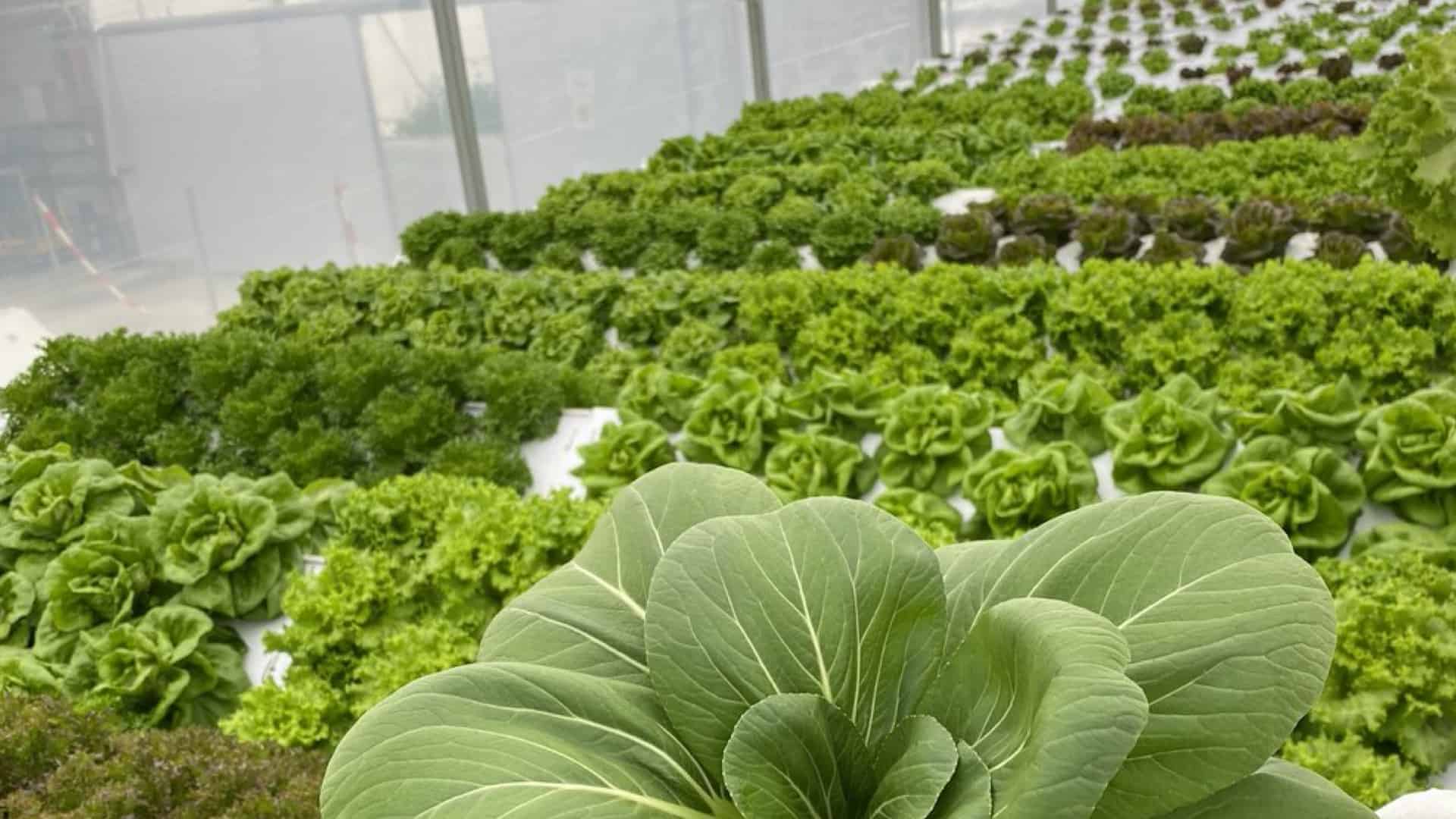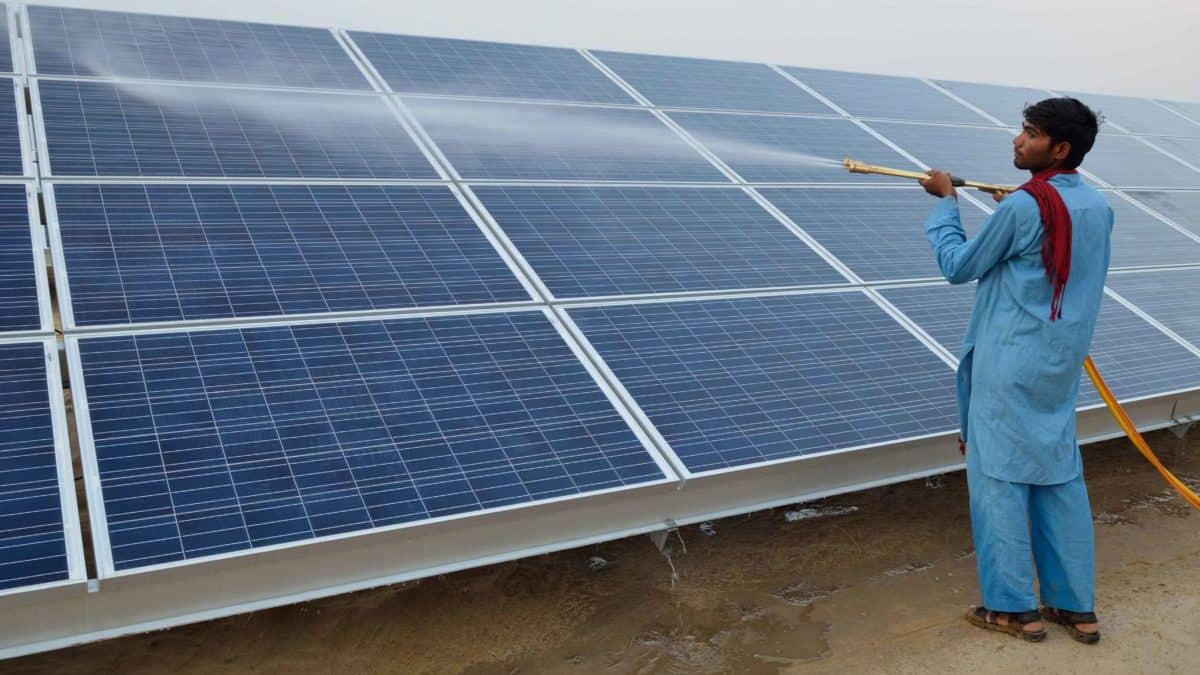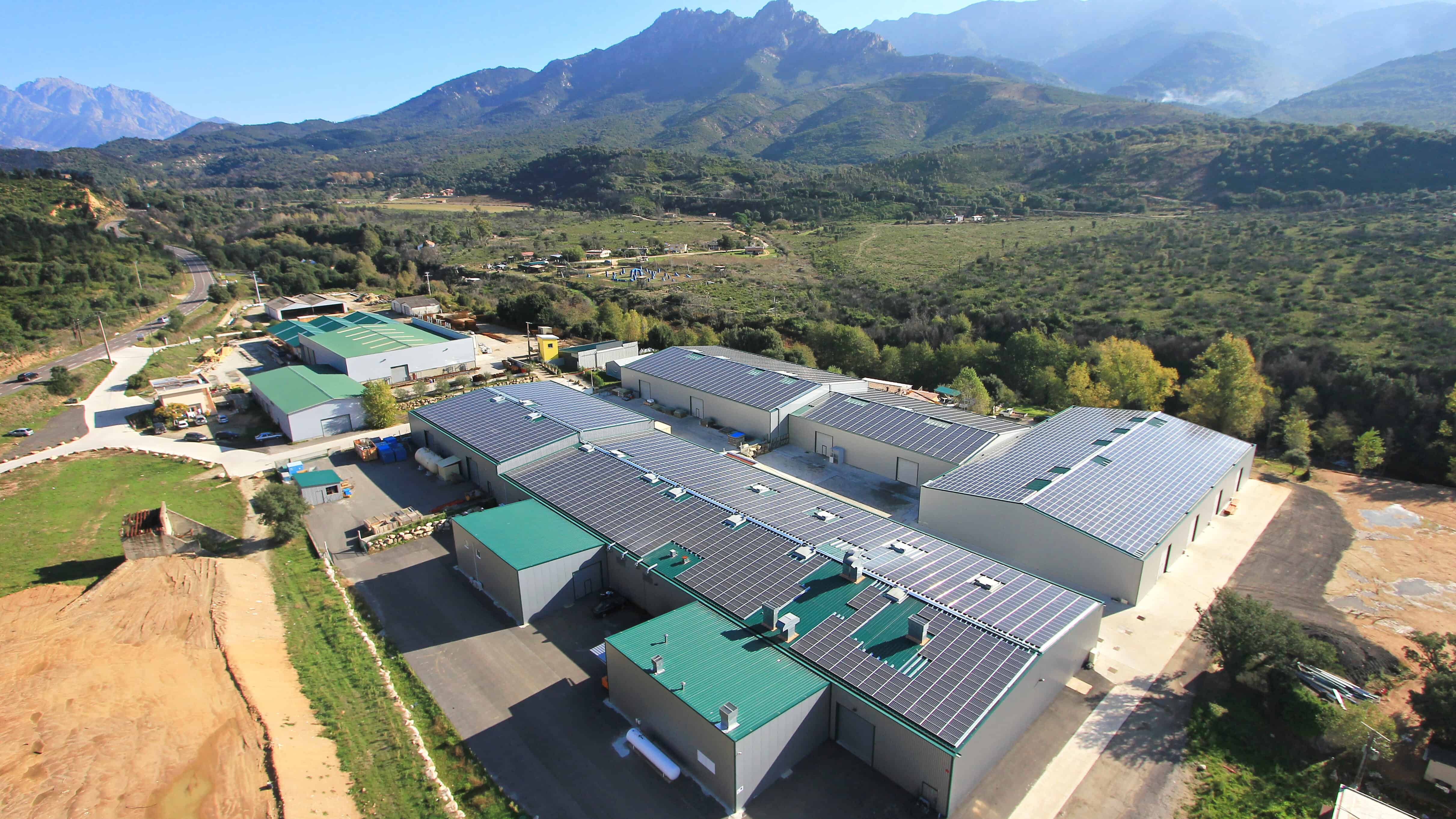In densely populated countries, land for solar installations is scarce. A promising way to make space for solar energy are dual-use installations above crops, also known as agrivoltaics. The market for agrivoltaics is growing, but innovation is still needed.
About 15 years ago, scientists started to ask if solar energy and agriculture can go hand in hand. In more recent time, big utilities such as Engie, Total and BayWa r.e. are looking for an answer to the same question at scale. This, in turn, has rekindled interest from scientific groups and now, it seems, they’re getting closer to a positive answer.
At the University of Massachusetts Crop Research and Education Center in collegiate New England, an array of solar panels are spaced farther apart than usual, and mounted a little over two meters off the ground. There’s room enough for professors, students, and farm animals to pass underneath, uninhibited by the installation.
Below the solar panels, crops such as kale and Brussels sprouts grow. Enough light gets through the solar installation to nourish the plants, while the solar radiation that hits the panels above is harvested as renewable energy.
The western Massachusetts university is not alone in its efforts to reconcile crop production with the production of electricity by dual-use solar panels. In fact, agrivoltaics is already a sizable industry with a growing number of applications.
In France, renewables company Total Quadran plans open an R&D unit dedicated to agrivoltaics and to build a 500 megawatt agrivoltaic installation – on agricultural land. According to PV Magazine, it will include sunshades, solar panels mounted on trackers and windbreaks. Total Quadran is partnering with the largest farming cooperative network in France to get the system up and running by 2025.
French electricity company Engie is busy developing a pilot project near Lyon. It consists of mobile photovoltaic panels sharing the same land that is used for agriculture.
Conventional modules have a problem
The rush of large utilities to enter the field of agrivoltaics isn’t widely known, and neither are its problems. Nearly all installations dotted around the globe use conventional PV modules.
But crystalline silicon cells are opaque and therefore block too much of the light for growing crops. That’s not what farmers want. In many countries, it is even forbidden by law to build such installations on agricultural land.
When they are allowed, the modules need to be spaced to ensure enough light for crop growth, lowering the amount of electricity produced at installation level by 20-50%.
Swiss startup Insolight has come up with a solution that is intuitively better: translucent solar panels. They use lenses that concentrate direct sunlight onto very small space-grade, high-efficiency cells on a transparent backplane. The module itself looks like an array of prisms with the solar cells nestled at the center of each one. They can actively regulate the amount of direct sunlight transmitted as per the plants hourly and seasonal requirements. In terms of electricity production, Insolight’s modules can produce more over a year than conventional modules, depending on where they are installed. They boast a world-record 30% efficiency for direct sun-to-electricity conversation. All the direct sunlight is changed into diffuse light upon traversing the modules, which is highly beneficial to the plants.
One study done at Wageningen University the Netherlands showed that if you used greenhouse cover materials that produced diffuse light, you could improve the production of sweet peppers by five to six percent in the summer months. A similar experiment demonstrated that diffuse light materials could raise the crop yield of cucumbers by nearly eight percent.
Diffuse light also offers plant life a more uniform temperature, with less of a risk of burning the top layer of crops. It’s a less stressful type of light nutrition, giving plants the chance to grow more uniformly and efficiently.

Invest in Startups
As one of Europe’s most active venture capital investors, we grant qualified private investors access to top-tier European startups. With investments starting at EUR/CHF 10’000, you can build your own tailored portfolio over time and diversify across stages and sectors.
A lucky coincidence
Insolight didn’t think of agrivoltaics when they began. Insolight’s founder Laurent Coulot and his team stumbled upon an article on the benefits of agrivoltaics and realized that their technology could improve on existing solutions. First, they thought that this field was a wishful dream of scientists. As it turned out, the agrivoltaics market was much bigger than they imagined, and the first clients that want to order panels for their own project installations were quickly found.
Modern agrivoltaics promise sustainable food being grown with renewable energy. The use of controlled diffuse light is not the only factor that may increase agricultural yields, the microclimate created by the panels will be able to prevent frost in spring. They will also protect fragile berries from rain and hail and reduce water evaporation which is an increasing challenge in many countries.
Depending on the region, Insolight’s solution will give farmers the opportunity to cultivate new crops they may not have been able to grow in their region prior, or continue to farm crops that have suffered from too much heat due to global warming. As well, diffuse light installations lead to temperature stability, so no more need to spend additional funds on cooling or shading solutions. And using agrivoltaic solutions on greenhouses will reduce the need for as many pesticides, as these greenhouses won’t need to be vented with such frequency.
There are a number of plants that don’t need aggressive amounts of direct sunlight. In fact, direct light harms certain plants, such as many types of berries, orchids, anthuriums, and certain succulents, regardless of the climate conditions. Some climates suffer from the problem of too much heat and direct light. For example, in Mediterranean and desert regions, greenhouses can get so hot that energy is needed to cool them down with air conditioning. Cooling down greenhouses is a big contribution to CO2-emissions. Reducing these emissions and gaining renewable energy at the same time would have a big climate impact and make it easier to cultivate crops in hotter places.
By using agrivoltaics to tune light, the agricultural and solar energy sectors can in unison boost crop yields, generate more renewable energy, and cut down on the resources needed to achieve these two benefits of sustainable development.
Written by
WITH US, YOU CANCO-INVEST IN DEEP TECH STARTUPS

Verve's investor network
With annual investments of EUR 60-70 mio, we belong to the top 10% most active startup investors in Europe. We therefore get you into competitive financing rounds alongside other world-class venture capital funds.
We empower you to build your individual portfolio.
More News
06.10.2021
How our startups contribute to the UN Sustainable Development Goals
Bertrand Piccard thinks that investors should see ecology through the lens of economic profitability. This article explains why his Solar Impulse Foundation awarded the “Efficient Solution Label” to our portfolio companies CleanGreens, Insolight, and 9T Labs, and how they contribute to sustainable development.
18.05.2020
Lessons learned in India applied to a Swiss startup
In this interview, Alan Rosling shares his thoughts on the future of solar, leveraging a storied past as a pioneer in the industry. As the co-founder of Kiran Energy in India and a board member of the Swiss startup Insolight, Alan believes tech entrepreneurs may bring solar into the light, especially for investors still skeptical of the industry’s potential.
30.04.2020
“Institutional investors started buying solar plants”
Rainer Isenrich is not only CEO and president of the board of Edisun Power, he's also a pioneer in solar power and convinced of its bright future. As he explains in this interview, investor's appetite for solar plants is growing but finding the surfaces to build them isn't trivial, a problem where startups like Insolight might be able to help.
Startups,Innovation andVenture Capital
Sign up to receive our weekly newsletter and learn about investing in technologies that are changing the world.




